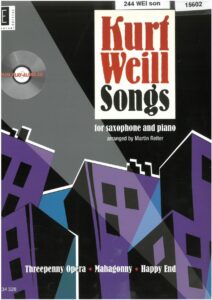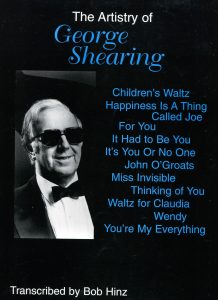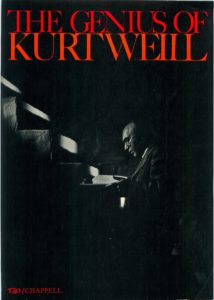Mack the knife – Kurt Weill as played by George Shearing sheet music
Best Sheet Music download from our Library.

Please, subscribe to our Sheet Music Library.
If you are already a subscriber, please, check our NEW SCORES’ page every month for new sheet music. THANK YOU!
Kurt Weill (1900-1950)
Kurt Julian Weill was born in Dessau on March 2, 1900. He is the third of fourth children of Emma Ackermann and Albert Weill, cantor at the Dessau synagogue (from 1899 to 1919) and composer, essentially of liturgical music.

His first composition essays date back to 1913. From 1915 to 1918, he followed the piano, harmony, composition and orchestration classes of Albert Bing, deputy head of the Dessau court theater. In 1918, he began studying music at the Hochschule in Berlin. In December 1920, Kurt Weill was admitted to the class of the composer and pianist Busoni at the Berlin Academy of Arts. He quickly became one of the brightest and most radical of the students.
It is based on the revaluation of the role of music in theater, on the notion of Spiel (play), that Kurt Weill raised his opera projects in 1925. His first collaboration with (L’Opéra de quat’sous [The Opera of the three cents]) is decisive for his future work. Hired on a communist ideal, this meeting changes his way of writing. He proclaims that he wants to be the “poor man’s Verdi” and orients his avant-garde expressionist style towards realism. He creates a new form of popular spectacle: halfway between theater and opera, his music draws from jazz and cabaret.

This time is a transition for the composer: he collaborates with the Austrian soprano Lotte Lenya, who quickly becomes his muse and privileged performer. Now inseparable, the duo married and became a legend.

In 1933, Kurt Weill’s Jewish origins forced him to flee to France. On November 26, 1933, during a concert in Salle Pleyel (Pleyel Hall), where excerpts from Der Silbersee are played, the composer Florent Schmitt shouted “Long live Hitler! “, supported by part of the room. Parisian newspapers attack Kurt Weill, especially Lucien Rebatet who denounces the “German Jewish virus” in the newspaper “Action française”.
In September 1935, he left for the United States. A major work from the early days of the exile is Er Weg des Verheissung/The Eternal Road, a biblical piece, which presents the history of the Jewish people. It is a mixture of theater, liturgy and opera. Kurt Weill later found success on Broadway, especially with Lady in the Dark and One Touch of Venus.

Since October 1941, he has participated in the war effort, joining the Fight For Freedom organization; He completed a civil service as an aerial observer in 1942. He also produced various works linked to the situation, in particular We Will Never Die, performed in New York and Los Angeles, and broadcast. In 1943, he obtained American nationality, which he had been requesting since 1937.
The most notable works of Weill’s last creative period are the American opera Street Scene, which presented an interesting synthesis between European opera and American musical comedy, and the musical tragedy Lost in the Stars, on the theme of South African apartheid with, in the musical, a certain African influence.
Kurt Weill died of a heart attack on April 3, 1950 in New York, during work on the musical comedy Huckleberry Finn, after Mark Twain’s play.
His contemporary, the composer Jean Wiener, described him like this: “What is unique and notable about Weill’s music is that he knew how to write music for everyone… but since not everyone does…”
Browse in the Library:
Or browse in the categories menus & download the Library Catalog PDF:
